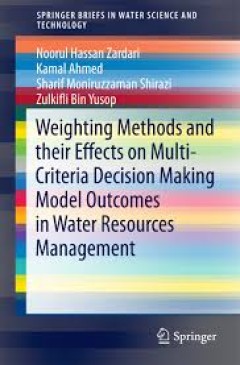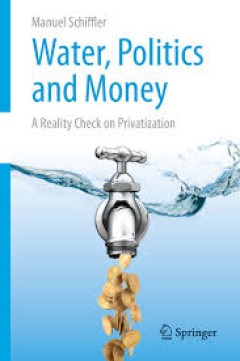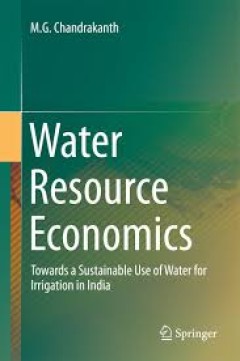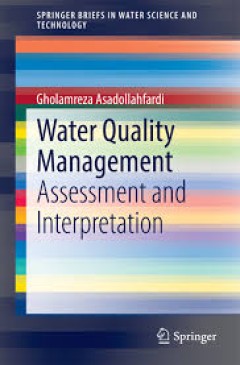Filter by

Weighting Methods and their Effects on Multi-Criteria Decision Making Model O…
This book provides a systematic way of how to make better decisions in water resources management. The applications of three weighting methods namely rating, ranking, and ratio are discussed in this book. Additionally, data mining on keywords is presented using three popular scholarly databases: Science Direct, Scopus, and SciVerse. Four abbreviated keywords (MCDM, MCDA, MCA, MADM) representing…
- Edition
- -
- ISBN/ISSN
- 978-3-319-12586-2
- Collation
- -
- Series Title
- -
- Call Number
- -

Sewer of progress :corporations, institutionalized corruption, and the strugg…
A creative and comprehensive exploration of the institutional forces undermining the management of environments critical to public health. For almost two decades, the citizens of Western Mexico have called for a cleanup of the Santiago River, a water source so polluted it emanates an overwhelming acidic stench. Toxic clouds of foam lift off the river in a strong wind. In Sewer of Progress , Cin…
- Edition
- -
- ISBN/ISSN
- 9780262374934
- Collation
- 1 online resource (336 pages).
- Series Title
- -
- Call Number
- -

Memo for Nemo
"Originally published in 2016 by Architectural Association.""An architectural, social, and cultural history of the undersea, using Verne's 20,000 Leagues Under the Sea, and more especially his charasmatic villain Captain Nemo, as his prompt"--OCLC-licensed vendor bibliographic record.
- Edition
- -
- ISBN/ISSN
- 9780262370486
- Collation
- 1 online resource.
- Series Title
- -
- Call Number
- -

Water, place, and equity
Many predict that by the end of the 21st century water will dominate world natural resource politics as oil does today. At present, much of the world's water is misallocated, wasted or polluted. This book argues that fairness in the allocation of water could be the cornerstone to a more secure future for mankind.OCLC-licensed vendor bibliographic record.
- Edition
- -
- ISBN/ISSN
- 9780262286107
- Collation
- 1 online resource (xii, 318 pages) :illustrations, maps.
- Series Title
- -
- Call Number
- -

America's water :federal roles and responsibilities
"A Twentieth Century Fund book."Were water considered an industry, it would be one of the largest in the United States, surely the most capital-intensive, and the most closely regulated by Congress. Yet as Peter Rogers argues in this readable, pragmatic, and scientifically grounded assessment of national water issues, it would also be one of the most fragmented and least coherent areas of publi…
- Edition
- -
- ISBN/ISSN
- 0585339228
- Collation
- 1 online resource (xi, 285 pages) :illustrations
- Series Title
- -
- Call Number
- -

Reflections on water :new approaches to transboundary conflicts and cooperation
This book offers conceptual and empirical support for the idea that the human relationship with water must move beyond rationalist definitions of water as product, property, and commodity.OCLC-licensed vendor bibliographic record.
- Edition
- -
- ISBN/ISSN
- 9780262268660
- Collation
- 1 online resource (xvi, 358 pages) :illustrations, maps.
- Series Title
- -
- Call Number
- -

Writing on water
OCLC-licensed vendor bibliographic record.
- Edition
- -
- ISBN/ISSN
- 0585380260
- Collation
- 1 online resource (xvi, 288 pages) :illustrations
- Series Title
- -
- Call Number
- -

Water, Politics and Money A Reality Check on Privatization
This book reveals all that can potentially happen when a private company takes over a local water supply system, both the good and the bad. Backed by real life stories of water privatization in action, author Manuel Schiffler presents a nuanced picture free of spin or fear mongering. Inside, readers will find a detailed analysis of the multiple forms of water privatization, from the outright…
- Edition
- -
- ISBN/ISSN
- 978-3-319-16691-9
- Collation
- -
- Series Title
- -
- Call Number
- -

Water Resource Economics Towards a Sustainable Use of Water for Irrigation i…
This book uses resource economics costing approaches incorporating externalities to estimate the returns for the country’s irrigation and demonstrates how underestimating the cost of water leads farmers to overestimate profits. The importance of the subject can be judged in light of the fact that India is the largest user of groundwater both for irrigation and for drinking purposes, pumping t…
- Edition
- -
- ISBN/ISSN
- 978-81-322-2479-2
- Collation
- -
- Series Title
- -
- Call Number
- -

Water Quality Management Assessment and Interpretation
Considering the significance of water quality for drinking, irrigation and industry, availability of accurate and sufficient water quality data is necessary and having enough data without proper interpretation is not helpful for water quality management decisions. Hence, analysis of the existing data and prediction of future of water quality is vital. The current volume first defines the imp…
- Edition
- -
- ISBN/ISSN
- 978-3-662-44725-3
- Collation
- -
- Series Title
- -
- Call Number
- -
 Computer Science, Information & General Works
Computer Science, Information & General Works  Philosophy & Psychology
Philosophy & Psychology  Religion
Religion  Social Sciences
Social Sciences  Language
Language  Pure Science
Pure Science  Applied Sciences
Applied Sciences  Art & Recreation
Art & Recreation  Literature
Literature  History & Geography
History & Geography